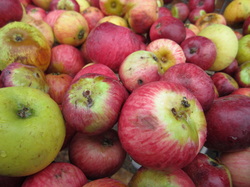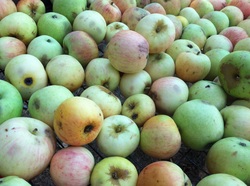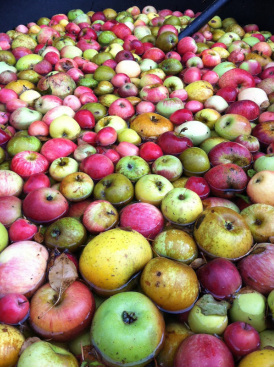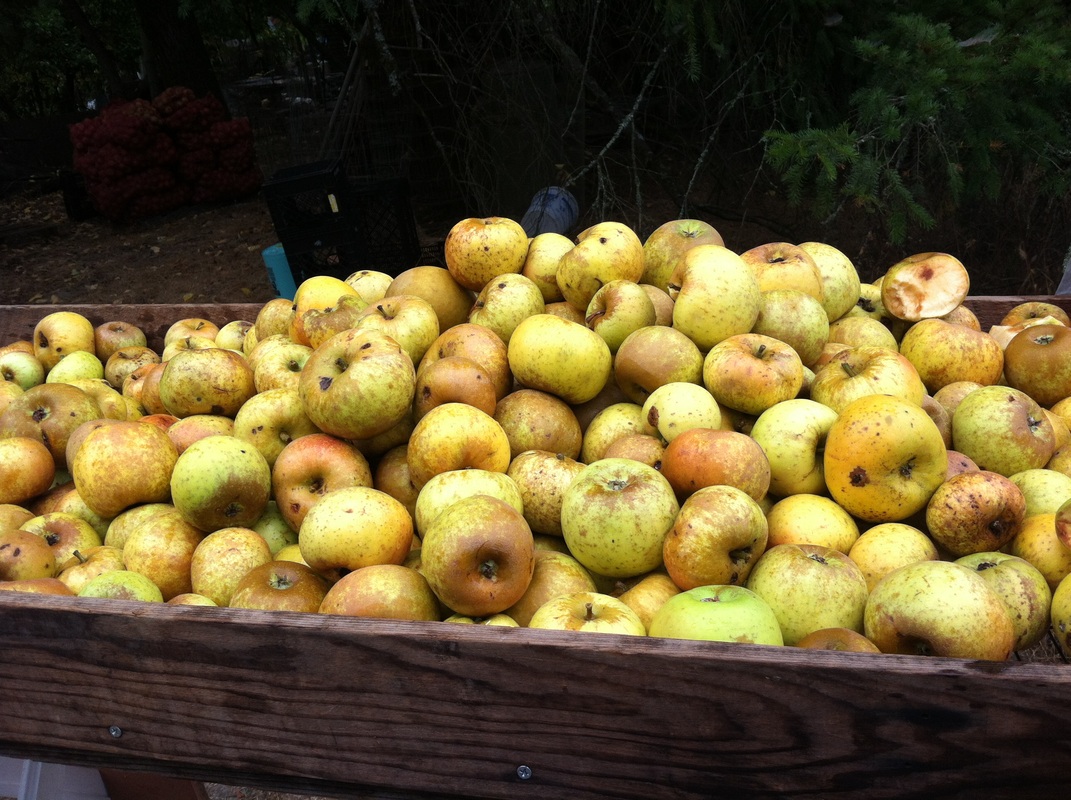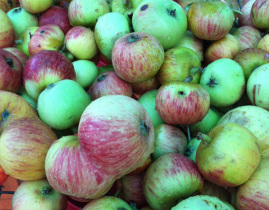Our apples
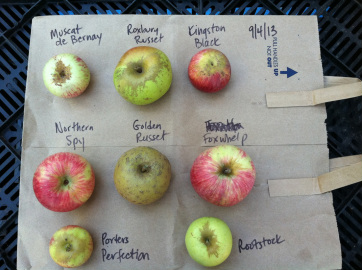
Aren't all apples cider apples?
That's like asking whether all grapes are wine grapes.
You can make drinkable wine from table grapes, but if you want to make a wine with complexity and elegance, it’s vinifera all the way. You can make decent cider with common dessert apples, but it won’t have the depth or structure of cider made with specialty fruit. Nehou and Kingston Black, among other varieties, are our Pinot Noir and Chardonnay. These old English, French, and American varieties were selected throughout the centuries exclusively for hard cider. (This is opposed to apples bred for fresh eating and cooking.) Many are bitter and unpleasant tasting, even inedible (called “spitters”), and have names that sound like characters from Downton Abbey. Bittersharps have high tannin and high acid; examples include Kingston Black, Porter's Perfection, and Foxwhelp. Bittersweets have high tannin and low acid, and include Yarlington Mill, Nehou, and Muscat de Bernay. Other multipurpose heirloom apples, like Gravenstein (called a sharp for its low tannin, high acid) and Roxbury Russet (a sweet with low tannin and low acid), contribute wonderful flavor profiles and aromas.
Yearly variations in our climate affect the levels of tannins, acids, and sugars, as they do for wine grapes, which is why our ciders don’t taste the same every year. (Unlike wine, with few exceptions, cider is better when made from a blend of apple varieties.)
These antique varieties are very rare in Sonoma County. At Tilted Shed, we’re working to get more farmers to grow them, and are using the 2-acre cider orchard at our Sebastopol farm as proving grounds. We began planting in January 2011, and have about 100 varieties in various stages of growth. Forty years ago, Pinot Noir vineyards were scarce here, but early adopters certainly reaped the rewards of their risk. Cider is quickly gaining in popularity and stature. We believe that our ciders can elevate the apple to greatness, and help save, and transform, the Sonoma County apple culture.
That's like asking whether all grapes are wine grapes.
You can make drinkable wine from table grapes, but if you want to make a wine with complexity and elegance, it’s vinifera all the way. You can make decent cider with common dessert apples, but it won’t have the depth or structure of cider made with specialty fruit. Nehou and Kingston Black, among other varieties, are our Pinot Noir and Chardonnay. These old English, French, and American varieties were selected throughout the centuries exclusively for hard cider. (This is opposed to apples bred for fresh eating and cooking.) Many are bitter and unpleasant tasting, even inedible (called “spitters”), and have names that sound like characters from Downton Abbey. Bittersharps have high tannin and high acid; examples include Kingston Black, Porter's Perfection, and Foxwhelp. Bittersweets have high tannin and low acid, and include Yarlington Mill, Nehou, and Muscat de Bernay. Other multipurpose heirloom apples, like Gravenstein (called a sharp for its low tannin, high acid) and Roxbury Russet (a sweet with low tannin and low acid), contribute wonderful flavor profiles and aromas.
Yearly variations in our climate affect the levels of tannins, acids, and sugars, as they do for wine grapes, which is why our ciders don’t taste the same every year. (Unlike wine, with few exceptions, cider is better when made from a blend of apple varieties.)
These antique varieties are very rare in Sonoma County. At Tilted Shed, we’re working to get more farmers to grow them, and are using the 2-acre cider orchard at our Sebastopol farm as proving grounds. We began planting in January 2011, and have about 100 varieties in various stages of growth. Forty years ago, Pinot Noir vineyards were scarce here, but early adopters certainly reaped the rewards of their risk. Cider is quickly gaining in popularity and stature. We believe that our ciders can elevate the apple to greatness, and help save, and transform, the Sonoma County apple culture.
|
Bittersharps: High tannin, high acid
Imagine sucking on a black tea bag while drinking a spoonful of lemon juice. That is what a bittersharp cider apples tastes like! Our favorite bittersharp an old English variety called Kingston Black. In general, cider is best made from a blend of different apples, but Kingston Black is fantastic for a single-variety cider. Kingston Black is a finicky tree to grow but completely worth the effort. Other examples of bittersharps that we use and grow include Foxwhelp and Porter’s Perfection. Crabapples, like Hewes and Transcendent, are also bittersharps but they may lack the sugars found in the traditional cider varieties. Sharps: Low tannin, high acid Most common dessert (eating) apples are sharps; their high acid provides that distinctive crisp, tart apple taste. Our favorite sharp for cider is, of course, the Gravenstein, Sonoma County's imperiled apple variety. It imparts great aromatics, brightness, and refreshing tartness. Other sharps that we use and grow: Espous Spitzenberg, Golden Russet, Jonathan, and Northern Spy. |
Bittersweets: High tannin, low acid
Bittersweets are the backbone of many of our ciders, and as raw fruit they are the most unpalatable. The easiest way to describe their taste is like sucking on a black tea bag while eating a small spoonful of sugar. However, once fermented, they add layers of complexity and structure. Muscat de Bernay, Nehou, and Yarlington Mill are the bittersweets we primarily use and grow, though we also are growing Dabinett and Muscadet de Dieppe, among others. Sweets: Low tannin, low acid Sweet apples don't provide much astringency or acidity to a fermented cider, but they do impart a lot of flavor and aromatics. Our favorite and most used sweet is Roxbury Russet. It is a prolific bearer and can reach very high sugar levels; we've had Roxbury Russets hit 21° brix, a sugar level more often found in wine grapes than apples. |
|
|
|

